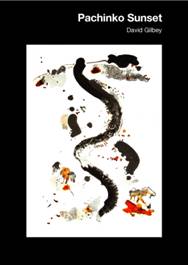
Pachinko Sunset by David Gilbey
Island Books, 2015
David Gilbey’s long-standing connections with Japan take centre stage in Pachinko Sunset, a collection that embraces simple, direct form to explore a layered series of issues linked with this relationship. The titular ‘pachinko’ refers to a popular Japanese game akin to pinball, in which a cascade of small metal balls are released to strike pins and be channelled off into different locations, with different prize implications for each. This image is a fair comparison for the text as a whole, as Pachinko Sunset delivers a sequence of poems in constant activity, heading in numerous directions at once, yet intrinsically caught up in the anxieties and ironies of travelling, translating, and relating Australia to Japan.
Written in English, Pachinko Sunset cannot help but engage with difficulties associated with language barriers. Gilbey’s linguistic interests are more down-to-earth than abstract, stemming perhaps from his considerable experience as an English teacher in Japan. Much of Pachinko Sunset is given over to scenes apparently taken from working with students. ‘Grammarian’ demonstrates some of the issues that can arise from these interactions, but undercuts these concerns with a playful tone. The poem is introduced with a line from Haruki Murakami: ‘Grammar is like the air: someone higher up might try to set rules for its use but people won’t necessarily follow them.’
Tonight at Sendai Toastmasters my obsessions are given authority, my fetishes legitimized. I must listen for mistakes and turn them into learning: “but I drank many sakes”; “I have much movies on my browser” and command felicities: “They usually image that the stars have fallen downwards very near the map of my heart.” Never have I attended with such concentration. Subtle, inquisitive thinkers speaking double tongues, lips in two lands – I am drawn into a 3D linguistic otherworld: “You can spend very leisurely by this stick.” “Before I got married with my husband.” “It’s maybe destiny.” I remember Hamlet: indirection finds direction out. Accidental bathos gets a laugh: “I felt a deep self-loathing and a headache.” Most of us get the bi-cultural pun: “I am an ankoholic.” They know the power of oxymoron, if not its name: “serious humour puts spice in your life… think crazy” and challenge the gender bias of language and culture: “It’s so surreal, this charming lady was jealoused by mother – she seems like superwoman for me. Please be aggressive.” I try to teach fun: don’t let the fear of making mistakes stop you from speaking. You will be understood and accepted despite our imperfect agreements, wild prepositions, odd adjectives and idiosyncratic verbs. Native speakers are always making mistakes. “The ordinary is amazing.”
The light-hearted tone and freedom of structure belie the potential for damage in more abrasive relationships with language. Grammatical fidelity is consciously pushed aside to permit a barrage of new, though un-named and faceless, voices. The speaker remains the only grounded, concrete presence, but the nameless other speakers all instate their own brief glimpses of perception, humour, and experience. The overall feeling is communal rather than condescending, but Gilbey recognises this risk.
Gilbey’s speakers are constantly reinventing ways to make connections through common ground, despite linguistic or contextual barriers. The first section is primarily preoccupied with teaching and day-to-day life in Japan, conscious of how things differ from life in Australia. The opening poem, ‘Australian Studies Conference, Hachioji’ sets out this contrast deftly, but as the collection continues, distance becomes far less obvious. By the time that Gilbey presents ‘Omi Hachiban: Ten Thumbnails’, an English and Romanji piece that links historical areas with the speaker’s present actions, this sense of potential isolation has been all but lost.
Gilbey has been a Visiting Professor of English on several occasions at Miyagi Gakuin Women’s University, Sendai, which accounts for the frequent presence of young Japanese women in his poems. Upon first reading, some poems raised concerns for their sexualised depictions, leaning towards stereotyping rather than the frankness and directness otherwise prevalent throughout Pachinko Sunset. The poetic speaker’s acknowledged sexism in ‘Iron Men’ clashes with the overt but tongue-in-cheek, farcical sexualisation of hats in ‘Hat Trick’. ‘Intercultural Communication’ quashes any fears of unconscious stereotyping as the speaker accidentally gives offence by stumbling over vowels and unintentionally pronounces an assessment of a female character’s body, combining chance humour with self-consciousness.
The final section, ‘Haibun Hikes’ is perhaps the strongest part of the text, as Gilbey experiments with longer verse styles in between shorter poems. Pachinko Sunset transforms into a ‘travel’ text, shifting between personal reflections whilst remaining consciously grounded in the differences between the familiar and unknown. Pachinko Sunset shares much in common with a travel narrative, but avoids indulgent tropes. Gilbey’s lightness of tone and efficient poetic style render cultural boundaries simultaneously clearer and less restrictive than ever in his strongly personal explorations of Japan.









